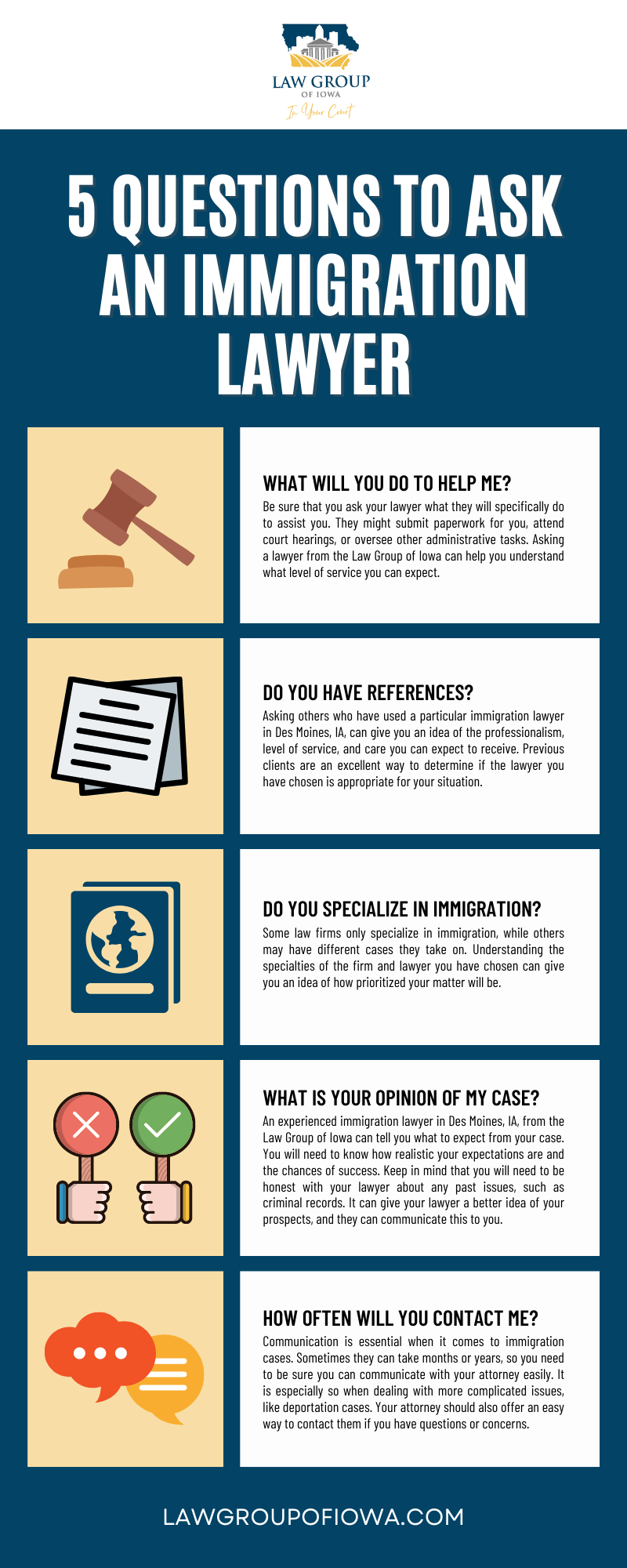Immigration Lawyer Des Moines, IA

For many people looking for better opportunities, becoming a citizen of the United States has a strong appeal. Without the proper legal guidance, however, actually going through the immigration process can be long and challenging. For many new immigrants, it can be hard to know where to start. Immigration can take years of preparation, understanding legal requirements, filling out documents, and becoming familiar with the laws. Our Des Moines, IA immigration lawyer from the Law Group of Iowa is here to help you complete each step with precision and compassion. Contact our Iowa firm today to set up a free consultation.
Table Of Contents
- Types Of Visas
- Rights And Protections For Immigrants
- Questions To Ask Your Immigration Lawyer
- Immigration Lawyer Infographic
- Immigration Statistics
- Contact Our Firm
The U.S. immigration system comes with many challenges and difficulties. Finding out if you are eligible to move and live in the United States can be hard to understand if you lack the legal guidance. One mistake is enough to set you back significantly, so it is critical that you discuss your options with a seasoned immigration lawyer. Our legal team has legal experience in multiple practice areas. We believe in providing affordable and quality legal assistance to every client, no matter their background. Clients should not have to settle with poor legal representation. Our skilled lawyers understand how hard it can be to find the right legal counsel. As a full-service law firm, we offer a variety of legal services for whatever legal matter you need assistance with.
Types Of Visas
A visa allows a person to travel to a country that they are not a resident of and is located in the passport. Every person who is a permanent resident or is not a U.S. citizen needs a visa to travel to the U.S. There are multiple types of visas that individuals can obtain. Individuals who intend to live in the U.S. can apply for an immigrant visa, which is commonly achieved through family or employer sponsorship. If you want to visit the U.S., but do not intend to permanently stay, you need to apply for a nonimmigrant visa.
Some of the most common types of visas granted to individuals include:
- B-1/B-2 visas: This is a temporary non-immigrant visa that allows the holder to travel to the U.S. for business/tourist purposes. The B-1 refers to business while the B-2 refers to tourism purposes.
- H1-B visas: This visa allows employers to temporarily employ foreign labor in special occupations/projects. A specialty occupation generally requires specialized knowledge and a bachelor’s degree or equivalent work experience. The visa is good for a maximum of three years but can be extended to six.
- L-1 visas: L-1 visas are another non-immigrant visa and their stay can depend upon the country that the immigrant is arriving from. L-1 visas can be broken into two categories: L-1A and L-1B. L-1A is used for executives and managers working in the U.S. and can be valid for 7 years while L-1B is for workers with specialized knowledge/training and is valid for up to 5 years.
- U visas: U visas are for foreigners or foreigners’ families that have been a victim of serious crimes, suffering major physical or mental abuse. Under this visa, the victim(s) are allowed to stay in the U.S. and cooperate with law enforcement and government officials in investigating and resolving the crime(s) perpetuated.
- Visitor visas: Generally the most common visa, this visa allows visitors to enter the U.S. as tourists for a short period of time. While some visitors simply need their passport to enter, other visitors will need to apply for a visitor visa in advance.
Generally, visas in the United States can be divided into two main categories, Immigrant Visas and Non-Immigrant Visas.
Non-Immigrant Visas
A non-immigrant visa is a type of travel document that allows a person to travel to the United States during the validity of the visa. People who travel to the US for a temporary amount of time and for a specific purpose are classified as non-immigrants because it is stated that it is their intention to return to their home country afterwards. Applications for non-immigrant United States Visas are completed online. Non-Immigrant Visa applications may be denied for a variety of reasons; an experienced immigration lawyer can help with such Visa denials.
Common US Non-immigrant Visas:
- B-2 Visa – B-2 visa is applicable to individuals who are traveling to the U.S. to visit for pleasure, to obtain medical care, or for similar reasons.
- TN Visa – Citizens of the U.S. and Canada and Mexico who wish to work temporarily in the U.S. in certain professions may qualify for a TN visa
- F Visas – Students who wish to live in the U.S. for a certain amount of time for educational purposes can apply for a non-immigrant F visa.
The wide range of visas that are available to individuals include many other non-immigrant visas. To determine whether you are eligible for a non-immigrant visa, it is important to seek the help of a qualified immigration lawyer who can assess the details of your case.
Immigrant Visas
Lawful Permanent Resident status
In order for foreign citizens who wish to live permanently in the United States to obtain Lawful Permanent Resident status, they must first obtain an immigrant visa. This is a document issued by a U.S. consular office overseas; it allows an individual to travel to the United States and apply for lawful permanent resident status. Once an individual is an LPR, he or she has the right to live and work permanently in the United States.
The process of applying for an immigrant visa can be challenging and take a significant amount of time – so it is highly recommended to consult a qualified immigration lawyer who can help fill out the paperwork completely and correctly. An immigration lawyer will also help make you aware of the intricacies of the process and help you be vigilant about the fees that are required at each stage. There are a number of factors that influence the processing time, generally the applicant should plan to live in the US for the foreseeable future.
Having a strong foundational understanding of immigration laws is essential if you want to go through the immigration process smoothly. Consulting with an experienced immigration lawyer who has the skills and experience can greatly increase your chances of successfully obtaining the visas you or your family need. Our immigration lawyers can evaluate your case and inform you of steps to take as well as mistakes to avoid. Contact a top immigration lawyer in Des Moines, IA today for more information.
Criminal Offenses And Immigration Status
Whenever a person is charged with a crime, it can have a significant detrimental impact on their life and future. This is especially true for an immigrant who is in the United States on an immigrant or non-immigrant visa or has a Green Card through adjustment of status. Being convicted of certain crimes can mean that the immigrant could face deportation. If you are an immigrant who has been charged or convicted of a crime, you need to contact our Des Moines immigration lawyer right away.
Deportable Crimes
The immigration laws set by the United States government are there to protect everyone who lives in the country. In order to be allowed to immigrate here, a person is required to show they have good moral character. Some criminal convictions will automatically trigger deportation, while others will result in immigration officials detaining the immigrant and beginning proceedings for deportation if they believe that person poses a risk to society.
The crimes where convictions usually result in deportation include the following:
Aggravated felonies: There are many types of crimes that fall under this category. Under most state laws, a felony charge is increased to an aggravated felony charge if there are certain factors that are alleged to have taken place, often some type of violent act or crimes that result in a prison sentence of five years or more. Some of the more common types of aggravated felonies that a Des Moines, IA immigration lawyer sees in the cases our firm handles include possession or distribution of child pornography, drug trafficking, burglary, theft, money laundering (of at least $100,000), tax evasion or fraud (of at least $200,000), and murder.
Crimes of moral turpitude: A crime that society deems as depraved or shocking are considered crimes of moral turpitude. Convictions of these crimes can leave an immigrant facing deportation. Crimes that fall into this category include assault, domestic violence, driving under the influence of alcohol and/or drugs, kidnapping, and rape. If an immigrant has been in this country less than five years and receives a jail sentence of at least a year for a crime considered one of moral turpitude, they can be deported. Two or more criminal convictions can also lead to deportation, no matter what the criminal offenses the person is convicted of are.
Once deported immigrants may not be allowed to return to the U.S. for a period of between 5 – 20 years or even permanently. This time period generally depends upon the crime committed as well as the court’s own discretion. It’s possible to appeal this process with The Board of Immigration Appeals (BIA). Doing so requires filing an appeal within 30 days of the decision made by the immigration judge.
One factor that may allow the immigrant to receive an exception and not be deported is if the crime is considered a petty offense. A petty offense is one where the maximum sentence a person can receive is up to one year, but the person served six months or less of the sentence.
Rights And Protections For Immigrants
“Give me your poor, your tired, your huddled masses yearning to be free…”
The United States of America has always been a nation of immigrants. Even the ancestors of Native Peoples immigrated from Siberia, 25,000 years ago. Today, America remains that “shining beacon on the hill” for many in the rest of the world. Today, however, seeking refuge and freedom in this country can be a difficult challenge for many immigrants. There are many steps to becoming a U.S. citizen or resident, our team at the Law Group of Iowa can assist you in navigating the process.
Have You Been Offered Employment in the U.S.?
A visa simply grants the citizen of one country permission to visit another. However, a foreign national who wishes to attend school or work in the United States needs a specific kind of visa. For example, a B1/B2 visa allows a foreign visitor not only to travel freely but also to conduct business within U.S. borders. If you are from abroad and plan to work for a U.S. employer, you will need what is known as an H1-B visa. This allows a foreign national to temporarily fill a position requiring specialized knowledge and skills. There are several other visa types; some of these allow a foreigner to live and work in the U.S. longer than others and are specific to certain situations.
Are You Seeking Refuge?
The United States has long been a destination for political asylum seekers, but also people who have been victims of violence and criminal activity in their countries of origin. There is a special kind of visa for crime victims, known as the U Visa. For example, many girls who wind up being exploited by sex traffickers in the U.S. have been lured from their homes or even abducted. Those who are rescued can apply for a U visa that will give them the right to employment, financial services and government-issued identification.
Becoming An American
Once you are here on a visa, you may have the opportunity to gain citizenship. This requires going through what is known as the naturalization process. If you have been a permanent resident for at least five years, an attorney from the Law Group of Iowa can guide you through this process as well.
Questions To Ask Your Immigration Lawyer
Immigration can cause long and complicated legal issues, so, naturally, you may have questions or concerns. An immigration lawyer in Des Moines, IA, can assist with immigration concerns you have or help with more complicated legal processes. If you are considering consulting an attorney, here are five questions you should ask to ensure they are the right fit for your case.
What Will You Do To Help Me?
Be sure that you ask your lawyer what they will specifically do to assist you. They might submit paperwork for you, attend court hearings, or oversee other administrative tasks. Asking your lawyer about specifics can help you understand what level of service you can expect.
Do You Have References?
Asking others who have used a particular immigration lawyer in your area can give you an idea of the professionalism, level of service, and care you can expect to receive. Previous clients are an excellent way to determine if the lawyer you have chosen is appropriate for your situation.
Do You Specialize In Immigration?
Some law firms only specialize in immigration, while others may have different cases they take on. Understanding the specialties of the firm and lawyer you have chosen can give you an idea of how prioritized your matter will be.
What Is Your Opinion of My Case?
An experienced immigration lawyer in Des Moines, IA, from the Law Group of Iowa can tell you what to expect from your case. You will need to know how realistic your expectations are and the chances of success. Keep in mind that you will need to be honest with your lawyer about any past issues, such as criminal records. It can give your lawyer a better idea of your prospects, and they can communicate this to you.
How Often Will You Contact Me?
Communication is essential when it comes to immigration cases. Sometimes they can take months or years, so you need to be sure you can communicate with your attorney easily. It is especially so when dealing with more complicated issues, like deportation cases. Your attorney should also offer an easy way to contact them if you have questions or concerns.
It is necessary to ask an immigration lawyer particular questions to get the best service possible. List what questions and concerns you have, and then contact an attorney from the Law Group of Iowa to get started on your case.
Immigration Lawyer Infographic
Immigration Statistics
According to the Migration Policy Institute, in 2021, immigrants comprised 13.6 percent of the total U.S. population, a figure that remains short of the record high of 14.8 percent in 1890 and slightly below the 13.7 percent share they comprised in 2019.
Contact Our Firm
Having a strong foundational understanding of immigration laws is essential if you want to go through the immigration process smoothly. Consulting with an experienced lawyer who has the skills and experience can greatly increase your chances of successfully immigrating. They can evaluate your case and inform you of steps to take as well as mistakes to avoid. Contact our Des Moines immigration lawyer today for more information.
Also, we can help you find court-approved interpreters on an as-needed basis. Just let us know if you want to take advantage of this service.
The Law Group of Iowa is pleased to offer you a free, no-obligation consultation. In this meeting which can happen online or face-to-face, is a great way to get your questions answered as well as learn about the exact steps you need to take.
You can start this process by email. On our contact page, you’ll find a form you can fill out and click on to send, our email address which is ideal if you want to give us more information than the form allows. You can also find our phone number and our physical address on our contact page.
Law Group of Iowa, Des Moines Immigration Lawyer
5601 Hickman Rd., Suite 3B, Des Moines, IA., 50310
Client Review
“I had the pleasure of working with Attorney Jason Yates. He is very responsive, professional and knowledgeable. I trusted him completely to help me navigate my case, and the outcome was better than I had hoped for. I recommend him to anyone looking for good representation. Thank you Jason!” Libby Hennings



